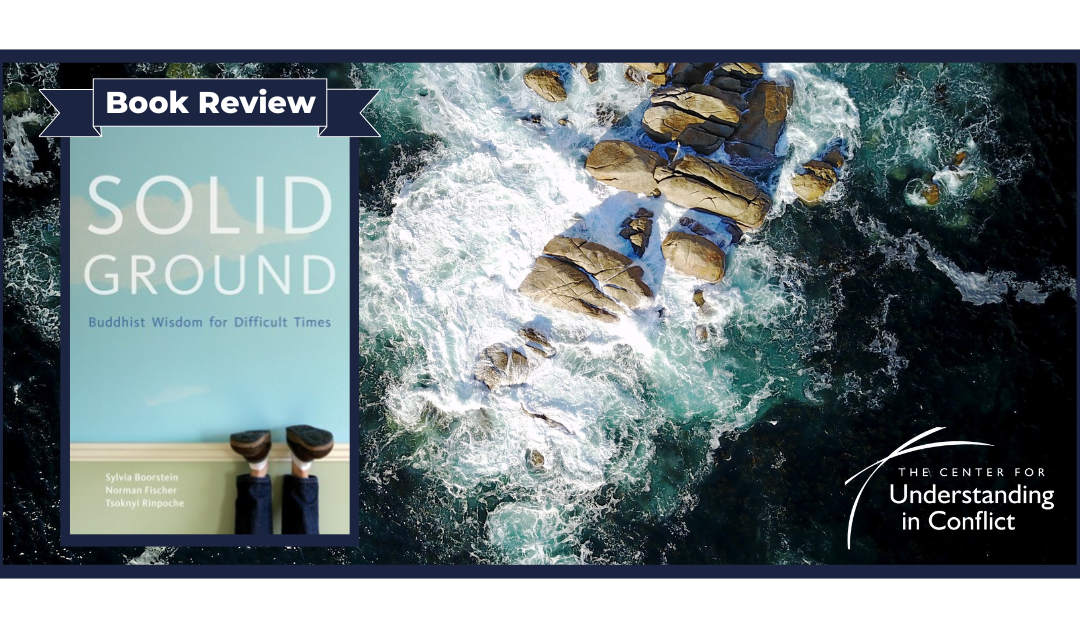Solid Ground: Buddhist Wisdom for Difficult Times by Sylvia Boorstein, Norman Fischer, and Tsoknyi Rinpoche is a thoughtful and reassuring guide for conflict resolution practitioners and others navigating our increasingly uncertain world. Drawing on Buddhist teachings, the book offers perspectives and practices that can help those working with conflict foster greater resilience, clarity, and compassion—qualities essential in times of social and personal upheaval.
From a conflict resolution standpoint, the book’s value lies in its commitment to seeing difficult situations as opportunities for growth and connection. Practitioners who adhere to the understanding-based approach or see conflict as something to work through collaboratively rather than fight against may find that the themes in Solid Ground echo their own values. Fischer, Boorstein, and Tsoknyi emphasize acceptance, kindness, and mindfulness as responses to hardship, powerful tools in mediation and conflict transformation. By practicing presence and understanding, conflict resolution professionals can help clients become more centered and self-aware, allowing for more genuine connections and cooperative resolutions.
A key element of the book is its encouragement to remain grounded when external circumstances become challenging or overwhelming. With frequent societal shifts and crises, staying centered is difficult yet crucial in modern times. Conflict practitioners who often deal with heightened emotions can anchor their clients by remaining calm and present. The book’s suggestion to focus on inner stability rather than trying to control external situations aligns with the mediator’s role in creating a calming space where people in conflict can safely express themselves. This sense of “solid ground” helps practitioners remain effective, modeling resilience for clients and helping them navigate their own complex situations with a clearer mind.
The authors also address the importance of compassion in difficult moments—a perspective that practitioners will find especially pertinent. In mediation, compassion helps practitioners maintain neutrality and build trust, even when working with challenging parties or intense disputes. As Boorstein and Fischer discuss, approaching others with compassion not only aids in understanding but also diffuses tension, creating an atmosphere where open, productive dialogue is possible. This resonates with the conflict resolution principle of fostering an environment where clients feel safe enough to share their deeper feelings and motivations, which can shift the conversation’s trajectory toward cooperation rather than contention.
For instance, Tsoknyi Rinpoche’s insights on dealing with fear and anxiety are directly applicable to conflict work, where clients often face uncertainty and the threat of loss. Conflict professionals can use Tsoknyi’s advice to help clients recognize these emotions without becoming overwhelmed, making it possible to explore solutions collaboratively. Practitioners who use the understanding-based approach might see connections here, as the approach prioritizes exploring what’s beneath surface positions to reveal underlying fears, values, and hopes. Tsoknyi’s guidance on sitting with discomfort helps mediators hold space for the challenging emotions that surface in conflict without rushing to resolve them prematurely.
One of the book’s most vital points is its encouragement to see challenging times not as problems to be solved but as experiences to be embraced and learned from. This perspective can be transformative in conflict resolution, where the goal is often to guide people from adversarial stances toward mutual understanding. The authors’ call for a mindful approach to life’s uncertainties reminds us that growth often comes through difficulty, a message that can help practitioners stay hopeful even when cases seem intractable. By embracing challenges as opportunities for greater self-awareness and connection, mediators and conflict professionals can more easily inspire clients to adopt a similar outlook.
Solid Ground reminds us that even in the face of conflict and uncertainty, there is value in holding space for understanding and empathy. The book offers philosophical and practical support for practitioners who are continuously called to bring these qualities to their work, enriching the toolkit they bring to each case. In times when societal challenges may feel overwhelming, Solid Ground is a source of strength and renewal, a guide to finding peace within so that one can be a beacon of calm and clarity for others.
